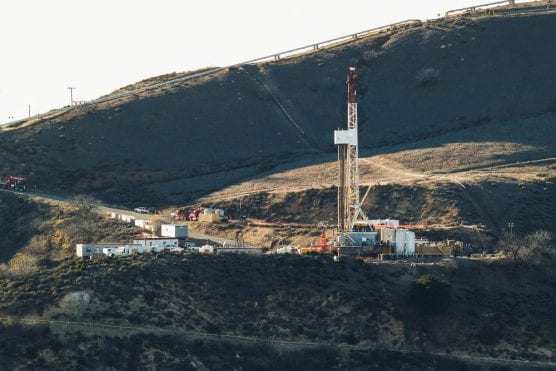The Los Angeles County Department of Public Health announced on Nov. 1 the selection of the University of California, Los Angeles to conduct the Aliso Canyon Disaster Health Research Study.
The total contract award is $20,993,333 and the research is expected to commence this month. The engagement with UCLA is for a five-year term with an option to extend for up to five additional one-year periods.
The purpose of the health study is to evaluate the short and long-term health impacts of the 2015-2016 gas blowout at the Southern California Gas Company’s Aliso Canyon underground gas storage facility. More than 109,000 metric tons of methane gas was released over the course of 111 days. As a result of the blowout, people in neighboring communities experienced “rotten egg” odors, oily mists and acute health symptoms, including eye, nose, and throat irritation, headaches and respiratory symptoms. Many residents reported ongoing health problems after returning home from temporary relocation and expressed concerns about potential long-term health effects.
UCLA’s world class research team will conduct the health study, which consists of five core components, including a comprehensive health research program, exposure assessment, data management and analysis, overall program administration and community engagement.
UCLA underscored the importance of community engagement and will undertake a comprehensive process for soliciting input from and disseminating information to the impacted communities throughout the health study’s implementation. The proposal put forth by UCLA was responsive to community feedback and will include clinical evaluations.
“UCLA’s proposal will provide comprehensive research that investigates the possible physical impacts of the Aliso Canyon Disaster but also, and more importantly, the potential far reaching impacts to mental, social, and community health and wellbeing,” said Los Angeles County Supervisor Sheila Kuehl. “The sheer scope of UCLA’s health study is impressive and appropriately responsive to the needs of the impacted communities who have been on the front lines of one of the greatest environmental disasters in U.S. history.”
“The award of the health study contract is a major milestone and the first step in bringing long-awaited scientific research and answers to residents affected by the Aliso Canyon incident,” said Supervisor Kathryn Barger. “Residents still have lingering questions about potential impacts to their health and well-being. By engaging this highly qualified group of researchers from UCLA, the county is showing it’s committed to bringing forth information that will empower and inform the impacted communities.”
“I’d like to thank the Scientific Oversight Committee and the panel of scientific and medical experts whose efforts enabled the solicitation and selection of this stellar research team,” said Barbara Ferrer, PhD, MPH, MEd, Director of Public Health. With the researchers in place, we are on the path to scientifically investigate unanswered questions and concerns raised by the communities that were impacted by the Aliso Canyon disaster.”
In addition to bringing long-awaited insights to community stakeholders about potential short and long-term health impacts related to the Aliso Canyon disaster and gas storage facility operations, the results of the research may be used by regulatory agencies, policymakers, healthcare providers and community organizations to inform local responses and/or actions that support the recovery and the health of the impacted communities.
The team of UCLA researchers and consultants conducting the health study span multiple research campuses and a range of relevant scientific disciplines.
The team includes well-established subject matter experts and internationally renowned scientists and healthcare practitioners. Collectively, they have extensive experience in exposure assessment and advanced modeling methods; clinical evaluations; data processing and integration; analyses of physical and mental health outcomes; assessment of community resiliency and disaster-related stressor; community engagement and public communications.
“People living close to the Aliso Canyon natural gas storage facility have legitimate questions about how emissions from the facility might affect their health now and in the future,” said Michael Jerrett, PhD, UCLA Fielding School of Public Health professor of environmental health sciences and co-principal investigator of the study. “We have brought together a team of the world’s best scientists to investigate the environmental and health impact of the facility, including physical and mental health, quality of life and overall well-being throughout their life course. We will focus on studying health impacts from the blowout disaster in 2015–2016 and from the routine emissions from the facility. The outcomes of these studies will be exceptionally important and also at times, very complex. We will present these findings in a clear and approachable way to provide the information needed by residents, regulators, and policymakers to understand the disaster impacts and take actions when needed.”
The health study will be overseen by a Scientific Oversight Committee composed of independent scientific experts and regulatory agency representatives. The oversight committee will receive regular updates on the health study from the UCLA research team during its implementation, will provide guidance, as needed, on research design and implementation and will evaluate progress on the health study on an annual basis after the completion of the health study’s third year. Public Health will serve in an administrative contract oversight and monitoring capacity.
“The team from UCLA is uniquely poised to examine the health impacts of the disaster at Aliso Canyon and provide much-needed answers to the community,” said Sophia Wang, PhD, SOC member and Professor at the City of Hope.
For more information on the Health Study and the upcoming research, please visit http://publichealth.lacounty.gov/eh/healthresearch/.
Like this:
Like Loading...
Related





 Tweet This
Tweet This Facebook
Facebook Digg This
Digg This Bookmark
Bookmark Stumble
Stumble RSS
RSS



























REAL NAMES ONLY: All posters must use their real individual or business name. This applies equally to Twitter account holders who use a nickname.
0 Comments
You can be the first one to leave a comment.